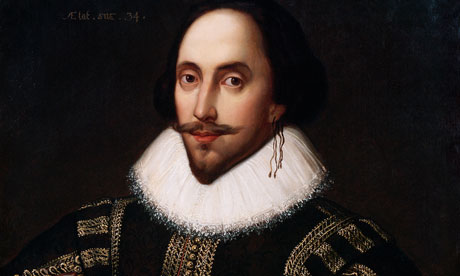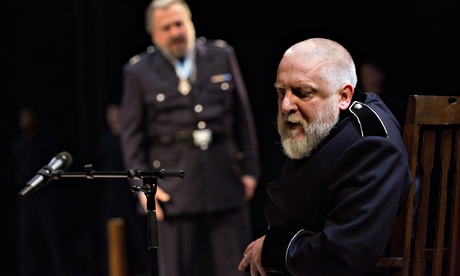This country may be the birthplace of Chaucer, Milton, Austen, the Brontë sisters and Dickens, but Britain has only one dominant calling card on the global cultural scene: William Shakespeare. It is now clear that the Bard and his works will loom large in the British arts festival that is planned to run alongside the Olympic Games in London next year.
The BBC reveals today that Patrick Stewart, David Morrissey, Rory Kinnear, Lindsay Duncan, David Suchet and James Purefoy are to appear together in the first of a run of four big-budget Shakespeare plays to be made for television by Sam Mendes's production company to celebrate the Cultural Olympiad.
With filming for Richard II, starring Ben Whishaw, starting on location at Pembroke Castle and St David's Cathedral in Wales next month, the BBC and Mendes's Neal Street Productions are joining a long line-up of major arts organisations who have chosen to wave a Shakespearean banner in the warm-up to the Games.
The British Museum is to mount a major exhibition about the Bard next year, while, more predictably, the Globe Theatre in London and the Royal Shakespeare Company in Stratford-on-Avon have all announced extensive Shakespeare projects to mark the occasion. BBC2's Richard II, adapted and directed by Rupert Goold, the award-winning associate director at the RSC, will be followed by adaptations of Henry IV parts I and II and Henry V, all set in the medieval era.
The BBC is also to mark the occasion with a two-part documentary series about Shakespeare, written and presented by historian Simon Schama to complement the new screen adaptations of the plays.
"Shakespeare is in the unique position of speaking universally while not losing any of the intensity of the language of where he comes from," said Schama this weekend in defence of the widespread move to adopt Shakespeare as Britain's cultural figurehead for the Games. "I have watched his plays in German and in French and the effect is the same. If you want something to celebrate in the year of 2012 that is not just the Queen and the Olympic Games, then Shakespeare is there for you. He is inexhaustible."
But the artistic director of the Globe, Dominic Dromgoole, is not the only one to raise an eyebrow at the amount of Shakespeare that has been commissioned. "It has been something of a race for all the Shakespeare plays," he said earlier this year, at the launch of his theatre's brave plan to stage a six-week season of Shakespeare plays each staged by visiting foreign theatre companies and beginning next year on 23 April, the Bard's birthday.
His Olympiad season will feature a version of Troilus and Cressida in Maori, The Taming of the Shrew in Urdu and an Arabic Tempest.
With even the National Theatre of Wales in the middle of preparations for a staging of Coriolanus next year as part of the RSC's World Shakespeare Festival, academics and arts practitioners are making the case for other literary contenders with global reputations.
Patricia Ingham, an expert in 19th century fiction and former Oxford don, said she wondered whether Shakespeare was really our only exportable brand. Pointing out that last year a Japanese university translated academic books on the Brontës and on Dickens, and that in the US Jane Eyre has been a feminist totem since the 1970s, Ingham said: "You only have to look at the number of films and television adaptations of Dickens's stories to see evidence of his huge appeal for the average person; the trouble with Shakespeare is that he is still only enjoyed by an elite. His global appeal is really a bit of a myth because very few people can actually read him. You have to have acquired a particular kind of skill or learning to enjoy Shakespeare."
Bonnie Greer, an academic and newly appointed head of the Brontë Society, said she felt the Brontë sisters represented "at a deep and profound level all that is seen as Englishness. Growing up as I did on the south side of Chicago in a black neighbourhood I knew about the Brontës before I knew about Shakespeare, partly through the films but the books too. And they still have enormous reach," she added.
Nevertheless next year, again from 23 April onwards, the World Shakespeare Festival, produced by the RSC in collaboration with other venues in London, including the Roundhouse, the Barbican and the National Theatre, will be staging productions and events across the country. The RSC's own contribution to the festival will include "What Country, friends, is this?", a selection of plays in which Shakespeare shipwrecks his characters on hostile shores.
At the British Museum, the exhibition "London 1612: Shakespeare's Theatre of the World" will look at the role of the emerging capital in his plays. More than 150 exhibits include the rare Ides of March coin commemorating the murder of Julius Caesar on 15 March 44BC and a copy of the revered first folio of the plays, published in 1623. Leading Shakespearean actors, such as Simon Callow, are also to take part in a special performance for the museum.
And none of these organisations could have chosen a better subject, according to Schama. "Shakespeare has the kind of elemental pain in his work that we see in the Greek plays of Aeschylus. He does the cosmic stuff and he also does jokes. Jane Austen's work, in contrast, has a very anglophone appeal. It is subtle and ironic – not that Shakespeare can't do that too – but if you want kings and the kind of drama that sees a character having his eyes gouged out on stage then you have to go Shakespeare."
Schama admits that Chaucer shares a similar universality, but argues his language presents a problem for many. "The amazing thing about Shakespeare is that if you actually deliver Hamlet, or Romeo and Juliet, to teenagers they actually do get the language.
"With Dickens, on the other hand, whom I love, he is not always great with women characters. You just don't get the titanic and rounded parts for women like Lady Macbeth, Cleopatra, Beatrice or Portia; characters that escape from stereotype."
The BBC's 2012 Shakespeare season will be produced by Neal Street Productions with American partners NBC Universal and WNET, and has been commissioned by the controller of BBC drama, Ben Stephenson, and by Janice Hadlow, the controller of BBC2.










